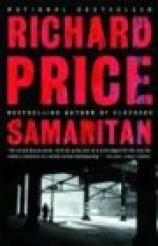Samaritan
Review
Samaritan
There are writers --- and then there are writers. We all have our favorites. There are times when you slap yet another metal sticky note onto your crowded psyche as a reminder to pick up a copy of something you read about in the book section of the newspaper --- and then there are those other times. You're headed down the freeway listening to an NPR program when you learn that a certain writer has a new book out. You very calmly but deliberately cut the wheel hard to the left with one hand, yank the emergency brake lever with the other and execute a perfect bootlegger turn across the grassy median in order to take the shortest route to the nearest bookstore. Once you're home with your new prize, you read with such intensity that, hours after you've turned the last page, your eyes still can't properly focus on anything more than a foot away from your face.
I don't know who that writer is for you, but for me it's Richard Price. When I heard that the author of CLOCKERS and FREEDOMLAND (and the screenwriter behind a very respectable selection of screenplays, including THE COLOR OF MONEY and MAD DOG AND GLORY) had a new book out, I knew that I'd be putting in my time as a book zombie. No problem. Like CLOCKERS and FREEDOMLAND, SAMARITAN is set in the city of Dempsey, New Jersey, a kind of East Coast every-town --- run down, ragged and carrying the post-industrial scars that are all that remain after the good times have gone elsewhere. And as with those two previous novels, the various threads of the story at the heart of SAMARITAN converge in the grimy buildings and littered playgrounds of the Hopewell housing project. The multifaceted and richly detailed story centers on two characters whose common history begins in the Hopewell projects.
Ray Mitchell, local-boy-made-good, has returned to Dempsey after a successful stint as a television writer --- a job he landed only after kicking a cocaine habit that cost him his marriage and left him estranged from his thirteen year-old daughter, who now lives with her mother in Manhattan, the skyline of which is visible from the balcony of Ray's apartment in the Dempsey suburbs. Ray's return to Dempsey is part of an effort to re-establish a relationship with his daughter, an effort that includes plans to give something back to the neighborhood of his youth.
Nerese Ammons, on the other hand, never left Dempsey. In her job as a police detective, she is never far from Hopewell and the poverty, drug addiction and violence that marred her own childhood and left her a single mother. She stoically managed the responsibilities of raising a teenaged son and accepted with willingness and a touch of philosophy the additional burden of caring for members of an extended family inherited from her absent, unlamented husband.
When Ray is found brutally beaten and barely alive in his apartment, Nerese, weeks away from retirement and escape to a new life in Florida, takes the case, her interest fueled by the sliver of preadolescent history she shares with Ray. But her investigation is hampered by Ray's refusal to name his assailant. So there's a mystery here to be sure and a darn good one. But there is so much depth and detail to SAMARITAN that to label it a mystery is like describing the Sistine Chapel as a building with a nice ceiling.
At its core, SAMARITAN is an examination of the awesome responsibility inherent in the role of the parent. It is about how, in dealing with that responsibility --- successfully or otherwise --- every person acting in that role adds to the collection of stories that will ultimately define who he or she is and who his or her children will become. Ray Mitchell, a man who understands and values stories, knows that his own story needs a bit of nudging to get it back on course to something resembling a happy ending. In this pursuit he volunteers to teach creative writing to a group of students at his old high school, pro bono. He speaks passionately to his students about the value of the stories in their lives and his message resonates with a few. But even as he makes headway with his students, Ray's ability to truly connect with his daughter is hobbled by his desperate need to be liked. And while his daughter is a willing and eager audience for the tales of his youth, Ray, for all his talent and skill, can't penetrate to the truth of his own story.
When Ray learns that an old school acquaintance doesn't have the money to bury her son, a victim of drug abuse, he and his daughter visit the woman in her Hopewell apartment and he presents her with a check, hoping that his daughter has taken notice of his extraordinary generosity. Though heartfelt and genuine, Ray's act of kindness, one of many in the story, is motivated by self-conscious needs so acute that they blind him to the responsibilities that go hand in hand with such generosity. It is this blindness that will leave Ray beaten and bleeding on the floor of his apartment and send Nerese Ammons on the trail of the person who put him in that condition.
SAMARITAN, indeed a first-rate mystery, has something important to say, but it eases its message out drop by drop in doses so carefully controlled that the ultimate impact is at once surprising and obvious. Richard Price has demonstrated once again a profound and often chilling understanding of what is inside our heads and a masterful ability to translate that unimaginable complexity into compact, highly readable prose.
Reviewed by Bob Rhubart on January 23, 2011
Samaritan
- Publication Date: June 8, 2004
- Genres: Fiction
- Paperback: 377 pages
- Publisher: Vintage
- ISBN-10: 037572513X
- ISBN-13: 9780375725135




